In diesem Artikel

Not always. Cross-platform frameworks work well for business apps, marketplaces, content platforms, and internal tools. However, apps that rely heavily on device-specific features, like real-time video processing, advanced animations, or hardware-level integrations, may still benefit from native development.
Cross-platform app development services involve creating a single codebase that is compiled into native components for each platform, allowing for better performance and more seamless integration with device features. In contrast, hybrid app development relies on browser-based technologies and typically runs within a web view, which can limit responsiveness and the native feel of the app.
Using one codebase for multiple platforms simplifies maintenance. Updates, bug fixes, and new features only need to be implemented once, reducing the chance of platform-specific errors and speeding up release cycles.
Popular frameworks include Flutter, React Native, and .NET MAUI. Flutter is ideal for highly customized interfaces, React Native is strong for teams with web development experience, and .NET MAUI is a good fit for enterprise teams already using Microsoft tools.





